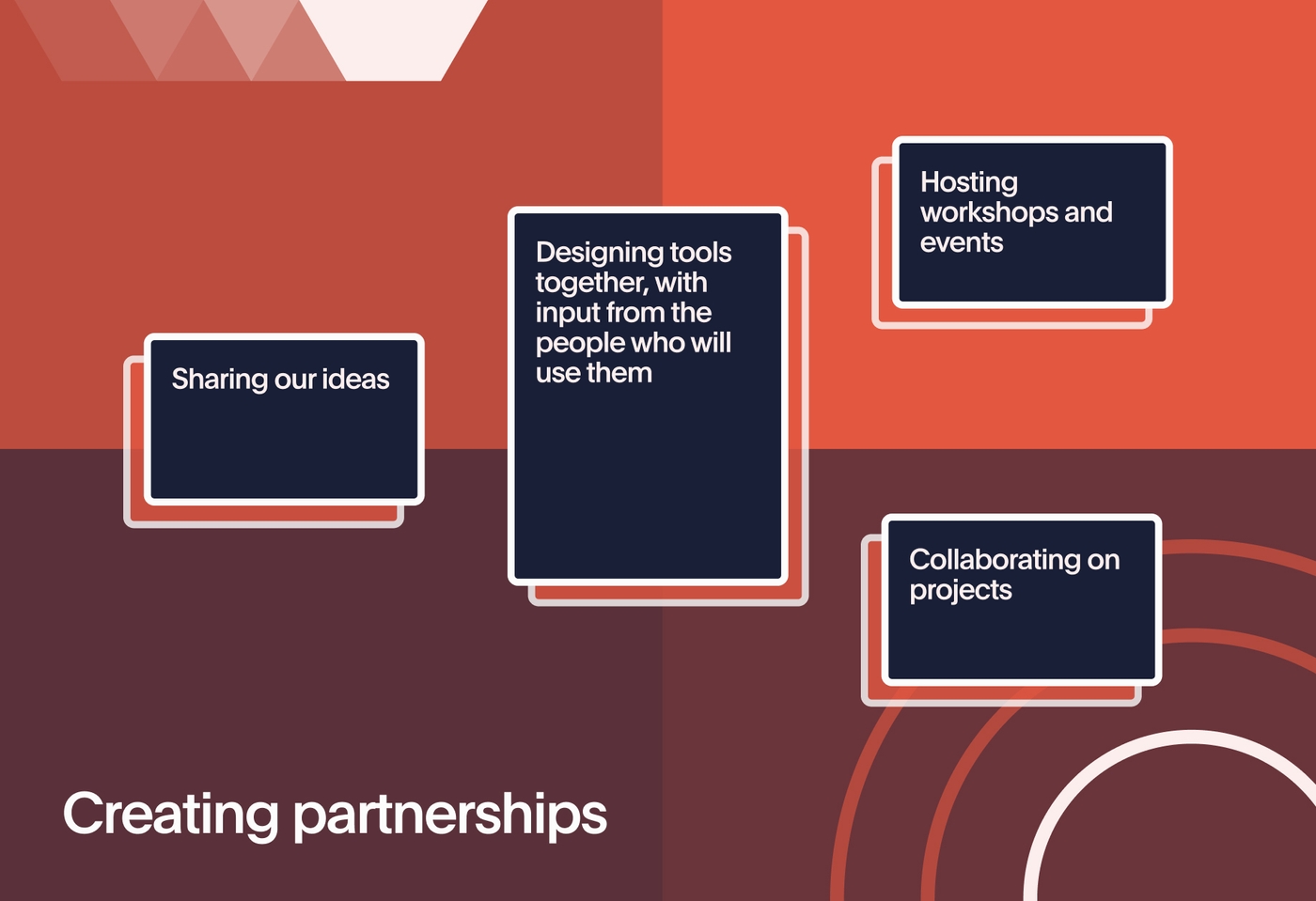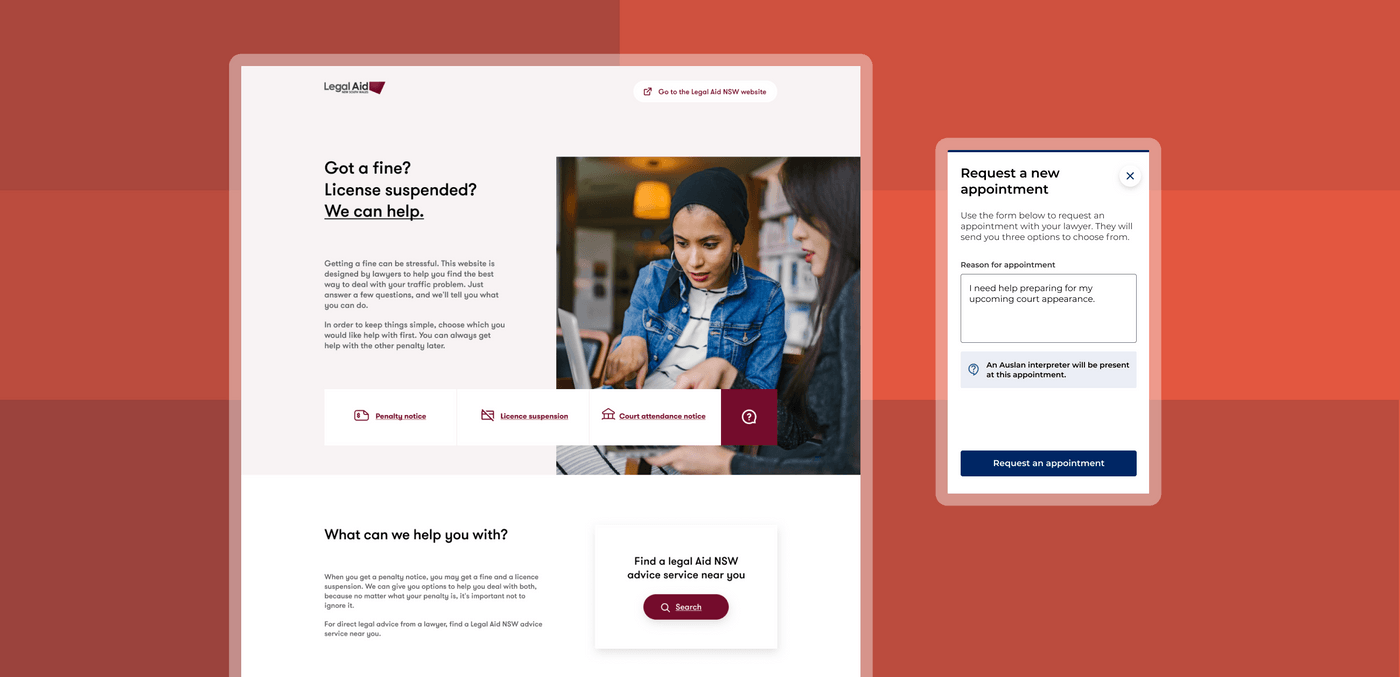Over the past ten years we’ve been committed to making justice more human-centred in Australia. It started with a meeting with the Director of a local court near our office who was interested in us helping her to build a website to help drive innovation. She told a story to our co-Founder Simon Goodrich that resonated with us.
"I got my iPhone fixed this morning and it was a beautiful experience. I was able to register before I went in, they knew my matter when I got there, I was updated on what was happening throughout the process and everything was resolved quickly.
Your phone not working really can throw you, you get pissed off about it, but they were able to turn what is a bad experience into a really good one. I reflect on the difference when you walk into my court, we’re still basing the experience on processes put in place in the 19th century. People come in with similar emotions, but we don’t do anything similar to make it better. What can you take away from the experience of getting my phone fixed and bring to my courtroom?"
This story lit a spark.
We never built that website (they kept the old one). Instead we focused on creating the first online form to generate a Family Violence Intervention Order. The work was a subsequent recommendation in the Victorian Royal Commission and highlighted that design and technology can be used for change. In our opinion, innovation is not about the newest use of technology. It is about improving an experience, finding a new solution that is so good it becomes standard.
Our passion for improving the experience of people seeking help for legal problems led to us getting involved with legal aid institutions, government organisations, and law schools around the country.
We’ve distilled some of our key learnings from working in the legal sector to help inform those who want to go on this journey toward a better justice system.
Bringing lawyers on the co-design journey
We believe that design isn’t only for designers. Anyone can design better experiences – in fact, lawyers do this all the time. Through re-drafting contracts so they are easier to understand, testing different creative approaches to solving problems, and working to change laws and policies to better serve people, lawyers actively work to create better experiences.
Getting lawyers involved in our research and design phases both helps upskill them in new techniques and approaches and gives us the benefit of learning from their skill sets, knowledge and experience. Lawyers are passionate about what they do, and we love to see that passion reflected in how we tackle problems people are experiencing with the legal system.
Part of this process is to work with lawyers to rethink how they approach issues. Traditionally, legal training encourages a conflict or opposition-based process. A key part of co-design is to be able to sit in the ambiguity as we generate solutions. Our success in designing better legal experience depends on designing with lawyers. Which is why we regularly present to academic classes. Portable co-Founder, Simon Goodrich, is a Senior Fellow at Melbourne Law School, where he runs a Masters Subject on Legal Innovation with Professor Gary Cazalet.
Using collaboration and curiosity to explore problems
Understanding the problems people are facing is the first step in exploring opportunities to create better legal outcomes.
Law should be accessible and engaging for those that can benefit from it most. At Portable we design directly with community groups and those with lived experience of navigating the legal system to make sure their voices are included throughout the process – from the way we design projects, to input on concepts, services and products. By taking a collaborative, human-centred approach to problem solving, we can discover new opportunities and ways of solving complex legal challenges.
Just like collaboration, curiosity is another key element to the human-centred design approach. When we approach complex problems with an open mindset, with curiosity and a continual interest in asking ‘why’, we create the conditions that enable us to unravel complex societal problems and identify opportunities to make meaningful change for people.

Creating multidisciplinary teams brings new perspective and skills
Designing alongside people who will use the end product is only one piece of the puzzle. We believe you also need to create a multidisciplinary, bringing together subject matter experts, designers, technologists, strategists, administrators, and the people who will use the service or product. We see the most impact when we have every perspective in the room.
In particular, we believe coupling designing with technology helps us to build services and experiences that improve access to justice and increase trust in legal processes.
Identify quick wins that meet needs early
Sometimes, the ideal solution is in progress but it’s years away from being fully funded and rolled out. So, we work to find the minimum viable solution (MVP), which means identifying one thing the solution can do really well and testing it with the relevant audience. This lets us prioritise quick wins to meet user needs and create change sooner rather than later in order to help build momentum for future versions of what we create.
By taking a design approach that prioritises user needs alongside minimum viability, we are able to initiate projects and create solutions that find a way around systemic, administrative, or funding challenges. For instance, instead of waiting for funding and building of a full technology platform (like a client portal), building an MVP means identifying a crucial point of interaction between legal clients and a service, and determining the most cost-efficient way to meet their needs at this point.

Design for the hardest use case, and you can design for everyone
Whilst we design minimum viable products that focus on quick wins, we typically do this by solving problems for people who have the most challenges with the current experience. Doing so creates opportunities to improve the experience for everyone. Typically, we do this by considering accessibility, using plain English language and by being intentional when designing key interactions, combined with continually designing and testing alongside our multidisciplinary team and users.
For many Australians, accessing legal help can be daunting. The law is often seen as an institution designed to support the few, at the expense of the many. In order to create a human-centred justice system, we must approach complex legal problems by bringing together people with deep legal knowledge and expertise and people with lived experience of the problem. This will enable us to find new ways of understanding the problems we face as a society and create sustainable change.
Building lasting partnerships
Our experience working with both the legal and government sector has taught us a lot about the need for genuine partnerships that go well beyond a single project focus. We also recognise our ongoing journey in developing knowledge of how the public service and legal sector operate, building and mobilising our expanding network and implementing project management and design processes to harness the expertise that sits within these institutions.
Partnerships are essential in working to make justice human-centred. At Portable, we actively work with organisations in the field to have impact. We have an interest in the academic space, working with Melbourne School of Law, Melbourne School of Government and the Sir Zelman Cowen Centre at Victoria University. amica, an online servie that helps separated couple divide their property and make parenting arrangements, would not be possible without our long term partnership with the Legal Services Commission of South Australia.
Partnership includes collaboration on projects, contributing to and authoring journal articles, hosting events together and creating spaces for us and others to explore and unpack the impact areas. It also includes creating tools together, across design and technology, with input from end users. We do this to ensure solutions are around well beyond the life cycle of the project, people within the legal space have the skills to adapt to new ways of working and custodians share our vision of a legal system that works for the people it was designed to serve.